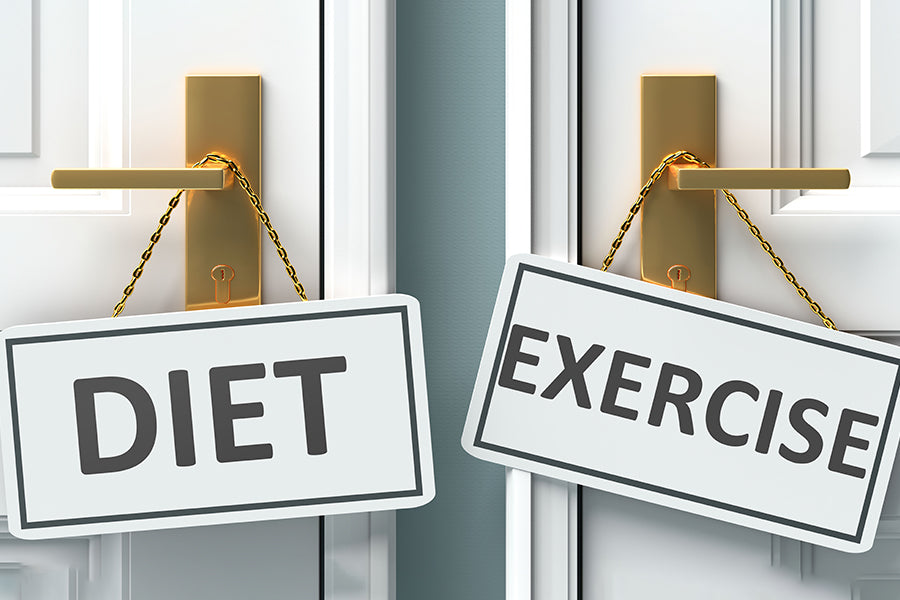When it comes to managing weight or treating obesity, people use various solutions, including medication and fat-burning supplements, surgery, etc. However, dieting and working out is at the top of the list of the most common ways that people pick.
Both strategies have proven effective for a large group of people facing weight gain for different reasons. However, those planning to start a weight loss journey often confuse which of the two is more beneficial.
Before we start with the comparison, it is important to understand that diet and exercise are needed to be part of the weight loss program so one can achieve the targeted results quickly and effectively. Additionally, one has to look at different factors to decide how much effort and dedication one needs to put into each subject.
In this article, we will look at diet and workout strategies for weight loss and state the benefits of each to draw a comparison.
Besides reading this informative piece of writing to acquire the needed information, we recommend you get in touch with a professional who would advise you based on your health and fitness status. Let’s dig in!
Related Article: How to Train and Diet for a Natural Bodybuilding?
Exercise or Diet: Which is More Important?
The diet vs. exercise debate has continued since the point in time when mankind discovered health benefits of maintaining appropriate body weight. So, can exercise lead to sustainable weight loss without dieting? Let us explore.
When dieting, many believe if they have exercised hard enough or long enough, they have earned the right to eat extra food. This is not necessarily true, as diet is much more important than exercise when shedding those pesky pounds.
Similarly, many overeaters think that an extra snack or even a full-fledged meal can't hurt their body weight goal because of their hard work at the gym. While it may not derail their diet completely, understanding and recognizing the importance of diet over exercise is key in controlling food intake and staying on track with dieting and weight loss goals.
So does that mean exercise alone cannot work for weight loss? A systematic review by the Department of Environmental Health, University of Cincinnati Medical Center, Cincinnati, USA, was conducted to understand the phenomena. The research compared diet-plus-exercise versus diet-only interventions on short-term and long-term weight loss.
MEDLINE and Cochrane Library were searched for this research from 1966 to June 2008 to retrieve relevant studies. The studies were then examined to determine if they met inclusion criteria, such as randomized controlled trials that compared diet plus exercise vs. diet-only interventions for six months or longer among overweight or obese adults. Following this process, 18 studies met the criteria for inclusion.
The research showed that diet-plus-exercise interventions were more effective than diet-only interventions for weight loss and body mass index. It also found that diet-plus-exercise interventions produced a 1.14 kg greater weight loss and 0.50 kg/m2 greater body mass index when compared to diet-only interventions.
The data for this research were independently extracted by two investigators using a standardized protocol, with a P value for heterogeneity of 0.4. Ultimately, the implications of findings demonstrate how diet and exercise can be complementary in creating lasting physical changes in individuals attempting to reduce weight or improve their overall health.
To conclude the results, diet-plus-exercise interventions had the edge over diet-only interventions when it came to providing greater weight loss over the long term. Even in studies that lasted two years or more, diet-plus-exercise was the clear winner.
This finding is exciting, given that dieting without exercise is significantly easier and far less time-consuming than diet-and-exercise programs.
Nonetheless, dieting alone was not enough to achieve lasting weight loss results. Despite either diet or diet-with-exercise programs, partial weight regains usually occur after a certain time. For this reason, it seems essential to look further into improving existing strategies to combat unwanted weight gain and find better means of achieving long-term weight loss.
The Correct Proportion of Diet & Exercise
The key to achieving weight loss goals is finding a balance between diet and exercise that will accelerate the transformation while providing your body with enough nutrients.
As the study above suggested, while eating healthy and cutting back on calories is essential, physical activity is also an important part of any weight loss plan. The best way to find the right combination of diet and exercise for your body is to create a plan that works with your lifestyle.
Coming to an appropriate diet, eating a balanced diet filled with fruits and vegetables, lean proteins, and whole grains can help ensure your body gets the fuel it needs for physical activity. Additionally, cutting back on processed foods and added sugars can reduce the calories you consume daily.
With exercise, the aim should be to create an active lifestyle that you can maintain long-term. Try to find activities you enjoy, such as walking, running, cycling, or swimming. Aim to reach 30 minutes of regular physical activity at least 5 days a week. Start slowly and gradually increase the intensity of your workouts as you become more comfortable.
Finally, it’s essential to remember that sustainable weight loss takes time. Make sure to stay patient and consistent with your diet and exercise plan. Celebrate each small victory along the way, such as fitting into a smaller size or running a faster mile. You can achieve your weight loss goals with the right combination of diet and exercise!
What Benefits Can You Get By Following a Healthy Diet?
By following a healthy diet, you can enjoy numerous benefits that help support a successful weight loss journey. In addition to supporting your health, eating a nutritious diet helps reduce the risk of developing certain diseases and can improve your mood. Eating a healthy diet over the long term helps to ensure that you can sustain any weight loss achieved and keep it off for good.
With the help of a diet, you can start on the path toward better health today! Want to know more to feel motivated? We have compiled a list of advantages you can gain with a proper diet plan.
Related Article: Vegan Diet for Weightloss: Does It Really Work?
Reduced Calorie Intake
By controlling your portion sizes and eating fewer calories than you burn, a diet can help you decrease the number of calories you consume daily. This is essential for weight loss since it creates a calorie deficit that forces your body to use stored fat as energy.
Improved Nutrient Intake
Diets can help you get the most out of your food. Eating healthier foods such as lean proteins, whole grains, and fresh fruits and vegetables helps ensure you get the nutrients needed for good health.
Increased Metabolism
Many diets focus on eating frequent meals throughout the day, which can boost your metabolism. Eating smaller meals more frequently helps to keep your metabolism running faster, which can help you burn more calories and lose weight.
Better Satiety
Many diets focus on foods high in fiber and protein, which help to make you feel fuller for longer. This reduces the chances of overeating and thus helps you stick to your diet and control calorie intake.
Improved Blood Sugar Levels
Following a diet low in processed carbohydrates, such as white bread, pasta, and sugars, helps to stabilize blood sugar levels. Stable blood sugar levels can help you maintain energy throughout the day and reduce cravings for unhealthy snacks.
Reduced Health Risks
A healthy diet can reduce your risk of developing heart disease and diabetes. By eating fewer processed foods and more nutrient-dense whole foods, you can help keep your body functioning properly and reduce your risk of developing health problems.
Improved Mood
Eating healthy foods can help boost your mood and reduce depression or anxiety. Eating nutrient-dense foods helps ensure that your body gets all the necessary vitamins and minerals for proper brain function, leading to improved mental health.
Long-Term Weight Loss
Maintaining a healthy diet over a long time can help you keep the weight off for good. Eating fewer calories and including nutrient-dense foods in your diet helps to support healthy long-term weight loss.
How Exercise Contributes to Your Weightloss Plan?
By incorporating regular exercise into your life, you can achieve all of these benefits and more to help you achieve your weight loss goals. A combination of a healthy diet and regular exercise is the best way to ensure long-term success in losing weight and keeping it off. Exercise has numerous benefits for weight loss, including:
Better Metabolic Rate
Regular exercise increases your metabolic rate, making it easier to burn calories and lose weight. Exercise also helps build muscle mass which further boosts metabolism.
Reduced Stress Levels
Exercise can help reduce stress and anxiety, which are major contributors to weight gain. When stressed, our bodies release hormones that tell us to eat more to cope with the stress. Exercise releases endorphins and endocannabinoids, hormones that help lift our moods. This can help you stay motivated on your journey to weight loss.
Improved Sleep Quality
Exercising regularly helps improve sleep quality, which is important for physical and mental health. Poor sleeping habits have been linked to weight gain, so it’s important to ensure sound sleep quality. Furthermore, regular exercise can give you a natural energy boost, helping you to stay energized throughout the day.
Increased Strength, Endurance & Memory
Regular exercise can improve strength and endurance, making it easier to complete more challenging exercises and stick to a weight loss routine. Moreover, exercise helps improve memory and cognitive function.
Improved Self-Esteem & Confidence
Exercise can help build confidence, as well as help you to feel better about your body image. This will help motivate you on your weight loss journey. Regular exercise is important to maintain a healthy weight in the long term, as it will help you keep off any excess pounds you may have lost during your weight loss journey.
Reduced Risk of Diseases
Regular exercise can reduce the risk of heart disease, diabetes, and stroke. You reduce the risk of developing these severe medical conditions as you lose weight.
Conclusion
Combining the benefits of diet and exercise is the best strategy for a fast weight-loss plan. However, it is crucial to maintain a healthy diet and stick to a workout plan appropriate for your fitness level. Besides that, choosing a suitable balance between your food intake and energy expenditure through sufficient physical activity is the correct approach to implement for desired weight-loss goals.
Reading List
Article Sources
- Wu, T., et al. “Long-Term Effectiveness of Diet-plus-Exercise Interventions vs. Diet-Only Interventions for Weight Loss: A Meta-Analysis.” Obesity Reviews, vol. 10, no. 3, May 2009, pp. 313–23. DOI.org (Crossref), https://doi.org/10.1111/j.1467-789X.2008.00547.x.








